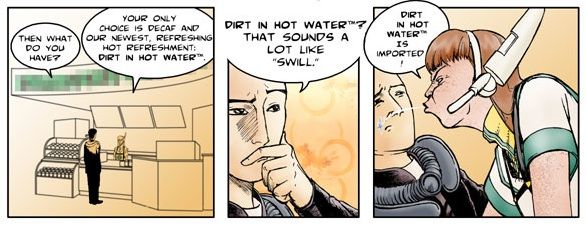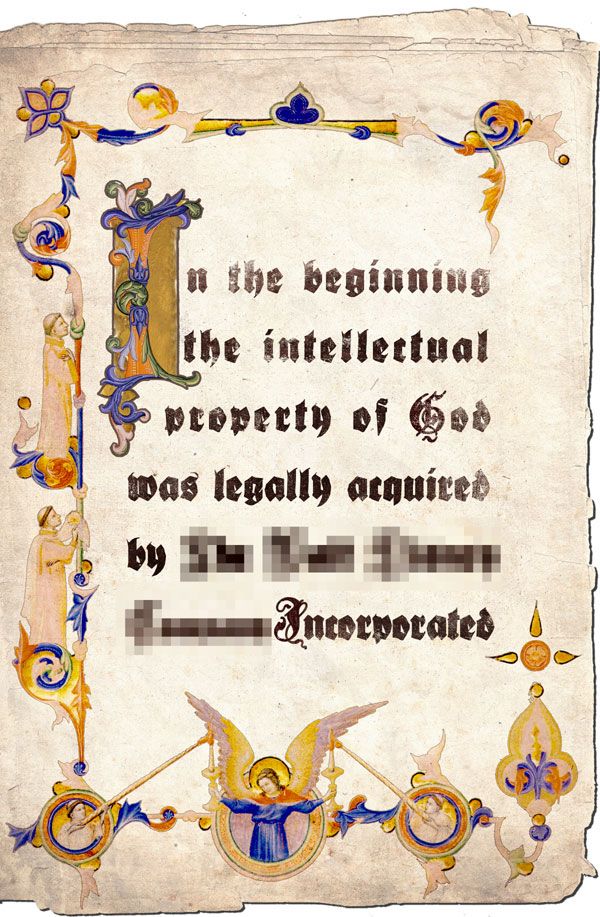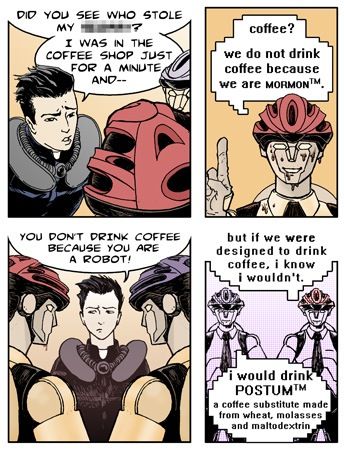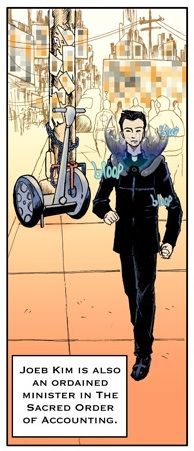Elan' Trinidad's latest comic, God™ (that's the shorter version of the name) is a bit of a challenge for strictly linear thinkers.
Trinidad was nominated for an Eisner Award for his haunting comic Speak No Evil: Melancholy of a Space Mexican, in which he illustrated the voicelessness of illegal aliens by creating a society that literally removed their mouths. He handled that heavy metaphor with great delicacy, creating a surrealistic world where such things are almost plausible.
While Speak No Evil was compact and self-contained, God™, is a sprawling and ambitious satire that takes on both commercialism and religiosity. It's also wickedly funny. The basic idea is that a large multinational corporation has bought up all the intellectual property rights to God and the whole cast of characters of Christianity, Judaism, and Islam. The comic intersperses slices of broad satire about commerce and religion with slices of a day in the life of accountant-priest Joeb Kim, who is having a tough day to say the least. I checked in with Elan' via e-mail to see what he is up to and where he is going with God™.
Brigid Alverson: Summarizing this comic defies me. Can you please explain briefly what it is about?
Elan' Trinidad: It often defies me too, so this is the simplest summary I could create:
Some day the intellectual property of God will be owned by a certain animation, media, and theme park corporation. The Apocalypse is looming and it is up to Reverend Joeb Kim CPA, a minister in the Sacred Order of Accounting, to stop it. (But I haven't gotten to that bit yet.)
Brigid: Your storytelling is really nonlinear—there have been lots of side trips so far, and the format and style vary from chapter to chapter. Do you have a master plan for all this, and what sort of other works are you looking at for inspiration?
Elan': I plan for the story to get a little simpler after Joeb finally gets to work and has a mental breakdown. There will be more religious symbolism later on. I predict an ending for the entire story, but I'll let my characters dictate if that actually becomes the ending.
After I decided that the underlying concept would best be told as a comedy, I was really inspired by Hitchhiker's Guide to the Galaxy, a lot of lesser known works of Douglas Adams and Monty Python. "And now for something completely different" is a funny way of telling a story and it keeps your audience awake.
Stylewise, there's a strong Hong Kong comics influence and obvious homages to 80's cartoons. I'm also inspired by Harold Sakuishi's Stopper Busujima. I found a volume of the manga in a Japanese restaurant and asked the waitress if I could have it. He draws funny but not too cartoony—a skill that wasn't as developed in the Hitchhiker's Guide comic book adaptation.
Brigid: How far ahead have you mapped out the story? It feels like we haven’t seen a lot of Joeb so far—do you have plans for him?
Elan': We'll see a lot more of him. He's the central character, but so far, the humor, pacing and the world this is set in is more of a hook than a Reverend/Accountant who has had his Segway stolen. I have a rather large story in my head: romantic interests, depictions of the afterlife, robots transforming at unpredictable times. I have no idea when I'll finish it or exactly how long it will take, but its one of those things I need to tell..
Brigid: Religion is a notoriously touchy subject. I see your comic as more of a satire of religiosity than religion itself, but have you gotten any pushback or hate mail because of it?
Elan': I had six angry letters about the depiction of Jews for "Marketing Strategy". All of them were written by people who were not Jewish. I'll post them up on my blog as soon as I'm finished writing them.
Jokes aside, a Mormon at San Diego Comic Con told me that the Mormon Robots were a funny idea, though he didn't read the comic at that point and only heard me talk about it at a panel discussion. The clergymen and women at my church approve of what I'm doing and planning to do.
Brigid: This comic is very “webby” compared to your previous comic, Speak No Evil. You use motion, you change the format of the comic and the background color of the website for different episodes, you even have fake ads on the website. Where do these ideas come from, and how hard are they to incorporate into the comic?
Elan': Speak No Evil was an exercise. Back then, I didn't do comics for a while. It was more traditional because I wasn't considering the little nuances of the web and how people enjoy the Internet.
I hate to sound all airy about it, but the ideas are coming from everywhere. They sort of mix and match and you visit a site that's somewhat amusing and then say to yourself "Wouldn't it be funny if..."
It isn't too hard for me to incorporate animation because I majored in Digital Media in art school and worked in commercials, broadcast design, and character animation. Some of these programs are second nature to me.
Brigid: You take commercialism as your subject matter and then blur out all the logos and trade names. Why?
Elan': How do you know that I didn't make a parody of the existing logo and then blur it out?
That's the beauty of those corporate logos, they're designed so well that you could still recognize them when you squint your eyes.
When you see a fake logo, they're always trying to be clever with the name and symbols. It takes you out of the world. There's something very real and nearly pornographic about using a mosaic filter.
I'm also afraid of getting sued.
Brigid: You have ad links on your website to products and services that tie in with the plot. I think the McCafe ad was a particularly brilliant choice, but these ads aren’t bringing in money and might bring in hostile attention. Why did you do this?
Elan': Ads are part of our culture. They're the flora and fauna of the 21st century.
I think, "think" meaning I'm making up this answer as I go along, why I put those ads is 1) It is funny, like Saturday Night Live funny. 2) It just seemed natural to this particular story. 3) The "artifacts" of a world can sort of tell more about that world than the characters and plot. Sometimes I use them as a sort of footnote.
I don't think certain companies would be angry at free publicity. Plus I talked to a lawyer about parody and fair use--- that's what the disclaimers are for. But we'll see what happens.
Brigid: I gather that your day job is working as an artist for an animation company that is not the one you are satirizing in God™. Are you concerned that the comic will affect you professionally?
Elan': A little. Its not my childhood dream to work for a certain company. But I have a friend who was trying to get me a job there. Most likely, if a certain company actually hired me, I would try to stay way at the bottom, try not to bring too much attention to myself, and prepare for the day they lay me off.
Brigid: You have mentioned the possibility of a print comic. Are you designing the comic with that in mind? How will you reconcile the different formats, use of motion, web features, etc. with a print comic?
Elan': Yes. One web page is actually 1/2 or sometimes 1/3 of a print page. When I'm doing the art, its formatted to 11x17 but I just crop the page for web. Most of the animation I'm doing are subtle enough so that they're not important to the story, but noticeable enough to appreciate the "web experience". I don't want to make motion comics because that's too much work. I've made it a rule that no character elements will be animated. Although, when we hit a climax in the story (I have no idea when I'll get to it) I'll have to break that rule and make a seperate version for print.
Brigid: OK, God™ makes me laugh, but is it strictly a comedy or do you have a serious theme underlying it all?
Elan': There was a time when I made funny comics and people thought they were sad. There was a time when I made serious comics and people thought they were funny. Alan Watts once said something like, "Everything is hilariously funny and deadly serious all at the same time".





